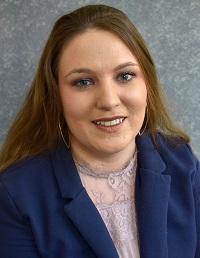A faculty member on the Duluth campus since 2015, Amanda Klein conducts research on neurological pain. In particular, she is working on mechanisms of pain and downstream signaling components of opioid receptors.
“My two major projects are in the areas of -potassium channel involvement in the development of opioid withdrawal and tolerance, and role of KATP channel signaling during neuropathy,” Klein said.
The goals of her research are to find new therapies for chronic pain, and alleviate opioid tolerance and withdrawal.
Klein’s interest in researching neurological pain was sparked by the prevalence of chronic pain in the United States. According to the Centers for Disease Control and Prevention, an estimated 50 million Americans have chronic pain and 19.6 million Americans have high-impact chronic pain, which means the pain interferes with their dayto-day lives and limits their quality of life. Klein believes there is a need to find better strategies to treat patients.

During graduate school at the University of California Davis, Klein lost a childhood friend to opioid overdose, which triggered her current research focus on opioids and neuropharmacology.
Growing up in Little Falls, Minn., Klein planned to become a family physician after high school. Her career ambitions, along with the fact that the University of Minnesota Duluth had a medical school that specializes in educating physicians dedicated to family medicine, led to her decision to attend UMD.
Early on in her undergraduate program, Klein realized that medicine wasn’t for her, but that she still liked science. She then sought advice from an advisor—which had a big impact on her future career path.
“I felt a little lost,” Klein said. “My favorite subjects were in the biological sciences and physiology, but I didn’t know what direction I should shift my career focus. I asked my academic advisor and she told me that I should volunteer in a lab, and perhaps apply for graduate school. During my sophomore year I started working with Dr. Matt Andrews, who at the time was in the Biology department, looking at the genetics of hibernation in ground squirrels. Dr. Andrews and Dr. Lester Drewes in the Medical School had a joint project available for a master’s student, so I stayed and finished my master’s thesis in 2007.”
Today as an assistant professor in the Department of Pharmacy Practice and Pharmaceutical Sciences, Klein says the research she’s been able to conduct wouldn’t be possible without some of the help she has received from others at the College of Pharmacy.
“I have been very lucky to interact and receive feedback from so many talented researchers across the College of Pharmacy and Academic Health Center,” Klein said. “The guidance and encouragement from the Office of the Associate Dean for Research has been especially helpful to me as a new principal investigator. Finally, I have also been extremely grateful for the many talented graduate and undergraduate students who have worked in my laboratory.”